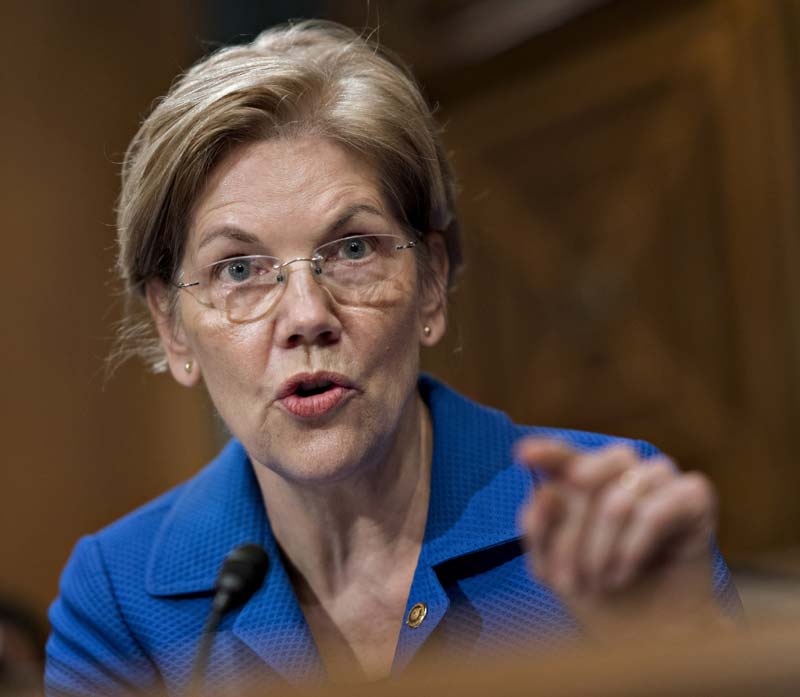 Andrew Harrer for Bloomberg.
Andrew Harrer for Bloomberg.
Sen. Elizabeth Warren, D-Mass., must have been a pretty good teacher. She's certainly schooling fellow Democrats on what to say about socialism and capitalism.
Appearing on CBS's "Face the Nation," she said: "I believe in markets. Markets that work. Markets that have a cop on the beat and have real rules and everybody follows them. I believe in a level playing field. And as long as we've got that, then we will get the best out of markets, because it means the people who come up with great ideas, who work hard are the ones who will prosper, not simply those who were born into wealth."
It's not the first time to be sure she has defended capitalism. Last July, she told CNBC's John Harwood: "I am a capitalist. Come on. I believe in markets. What I don't believe in is theft; what I don't believe in is cheating. That's where the difference is." She added: "I love what markets can do, I love what functioning economies can do. They are what make us rich, they are what create opportunity. But only fair markets, markets with rules. Markets without rules is about the rich take it all, it's about the powerful get all of it. And that's what's gone wrong in America."
Her answer - capitalism is great but needs rules to prevent market failures - is good policy and good politics. As for the latter, poll after poll shows American react positively to "capitalism" and negatively to "socialism."
To the extent Sen. Bernie Sanders, I-Vt., insists on calling himself a socialist, he is playing into President Donald Trump's hands and turning off voters that Democrats will need to win in the general election.
On the merits, Warren is right. Capitalism has lifted millions out of poverty around the world, allowed Americans to enjoy tremendous prosperity and given us a cornucopia of cool stuff. But there are market failures (e.g., unequal access to information, regulatory capture, pollution and other externalities) that must be corrected and all sort of problems and inequities that as a moral and political matter we cannot tolerate (e.g. those displaced by trade, intensifying income inequality).
Nevertheless, many Democrats seem allergic to embracing "capitalism." In an interview with "Morning Joe" earlier this month and on "Face the Nation," former Colorado Gov. John Hickenlooper, D, an honest-to-goodness capitalist who started his own business, flailed around refusing to identify with the term. He finally was badgered by Margaret Brennan on "Face the Nation" into acknowledging that he is in fact pro-capitalist:
BRENNAN: Well I - I want to offer you the chance to clear something up here because you did an interview earlier in the week where you were asked three times if you would call yourself a proud capitalist and you wouldn't directly answer the question. It led Howard Schultz, who's possibly a candidate, to say, "If even a successful businessman and entrepreneur like Governor Hickenlooper can't openly support capitalism the Democratic primary, it's clear this is Senator Sanders's party now." Why are you uncomfortable calling yourself a proud capitalist?
HICKENLOOPER: I've been - the point I was making is that we defined people by these labels that, that often have all kinds of associations and baggage with them in that sense. Do I believe in small business? Of course I believe in small business. I started probably more than 20 different small businesses. I'd have - in one year I'd have over a million customers. I understand that. But what's happening - I think it's kind of a silly question. We should be looking at some of the reasons behind why we have less and less startups.
BRENNAN: Sure.
HICKENLOOPER: We should look at of the reasons why, you know, more and more people aren't wanting to start a business.
BRENNAN: Sure. But you understand that -
HICKENLOOPER: But -
BRENNAN: - it is a main Republican talking point to label Democrats right now as anti-business socialists.
HICKENLOOPER: Right? But that's ridiculous, obviously there are -
BRENNAN: So you would reject that.
HICKENLOOPER: - the Democratic Party is a big tent.
BRENNAN: You reject that label.
HICKENLOOPER: Yes. Absolutely. I think that's not accurate. And I think that, as your interview with Elizabeth Warren showed, there are all kinds of, of, of different people making up the Democratic Party. Do I believe in - in free markets? Do I believe that, you know, you put capital to work to create jobs and improve your community?
You know back when I was a kid, businesses understood the part of their job wasn't just to make as much profit as they could but it was to create the community. Once you get back into these labels, am I a capitalist? Am I a socialist? How much of, how much of a capitalist I am I versus how much of a socialist? That becomes kind of silly doesn't it?
BRENNAN: Well -
HICKENLOOPER: I mean,
BRENNAN: If -
HICKENLOOPER: In a funny way -
BRENNAN: The other candidates were comfortable answering the question so I wanted to offer you a chance to, to answer it. I understand you're not comfortable directly answering -
HICKENLOOPER: I, I -
BRENNAN: But I want to move on to some -
HICKENLOOPER: Well I-I'm comfortable. I'm hap-
BRENNAN: Go ahead.
HICKENLOOPER: Let me just - I'm happy to say I'm a capitalist, but I think at a certain point the labels do nothing but divide us.
That's not how confident candidates talk, to put it mildly.
Contrast that with Beto O'Rourke. In his Senate run he refused to embrace Sander's "socialist" label, although Sen. Ted Cruz, R-Texas, tried his best to pin it on him. Again last month, he said, "I'm a capitalist." He explained, "I don't see how we're able to meet any of the fundamental challenges that we have as a country without, in part, harnessing the power of the market." That's how it's done.
Likewise, former congressman and millionaire entrepreneur John Delaney wrote for CNN that socialism is not the way to go. "Democrats need to restore capitalism's promise," he wrote. "We're not going to take back the White House by appealing to 18% of the population. Gifting President Trump a second term in the pursuit of ideological purity not rooted in sound economics or moving the argument further would be a tragedy for working people, for vulnerable communities and for the country as a whole." He's got that right.
And one doesn't have to embrace socialism, of course, to go after inequities. When Gov. Jay Inslee, D, of Washington, home to Amazon was interviewed on and said he had no problem with the idea of going after tech monopolies (which Warren has proposed).
"We need to restrain some of these forces that are abusing our privacy, shutting off access to the net, and having unfair tax advantages," he said. He added, an apparent reference to the controversy over Amazon's negotiations with New York, that "we need to stop corporations from blackmailing local communities to get giant tax giveaways, or they will move out of town, where they pit two communities against each other."
In sum, there is no better example of their foolish sprint to the far left than Democrats queasy about embracing capitalism. They shouldn't be. They are never going to pass Sanders on the left. Moreover, the vast majority of Democrats don't embrace "socialism."
If they cannot figure out how to defend mainstream positions while they are going to attain progressive ends, they probably aren't general-election presidential material.
Sign up for the daily JWR update. It's free. Just click here.
(COMMENT, BELOW)


 Contact The Editor
Contact The Editor
 Articles By This Author
Articles By This Author